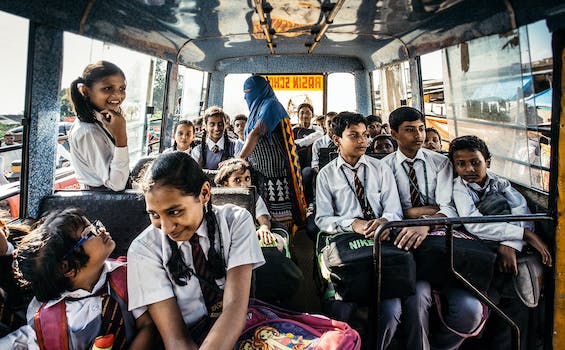

-
Table of Contents
Unleashing the untamed spirits of India's future.
Introduction
The Haunting Specter of India's Youth refers to the pressing issue of the challenges and struggles faced by the younger generation in India. This haunting specter encompasses various socio-economic, cultural, and educational aspects that impact the lives of India's youth. It highlights the need for attention and action to address these issues and ensure a brighter future for the country's young population.
The Impact of Unemployment on India's Youth
India's youth, a vibrant and dynamic force, is facing a haunting specter that threatens their future - unemployment. The impact of unemployment on India's youth is far-reaching and has the potential to shape the trajectory of the nation's development.
One of the most significant consequences of unemployment among the youth is the loss of human capital. India boasts a large and diverse pool of talented young individuals who possess the skills and knowledge necessary to contribute to the country's growth. However, when these young minds are left idle due to a lack of employment opportunities, their potential remains untapped, resulting in a loss for both the individuals and the nation as a whole.
Furthermore, unemployment among the youth can lead to a sense of disillusionment and frustration. As young people struggle to find meaningful employment, they may become disheartened and lose faith in the system. This can have detrimental effects on their mental health and overall well-being, as they grapple with feelings of worthlessness and hopelessness. The impact of this emotional toll cannot be underestimated, as it can hinder their ability to pursue their dreams and aspirations.
The economic implications of youth unemployment are also significant. When a large portion of the population is unable to find work, it puts a strain on the economy. Unemployment leads to a decrease in consumer spending, as individuals have less disposable income. This, in turn, affects businesses and industries, leading to a slowdown in economic growth. Moreover, the burden of unemployment falls on the government, as it must provide social welfare programs and support to those who are jobless. This diverts resources that could otherwise be invested in infrastructure development and other areas crucial for the nation's progress.
The impact of unemployment on India's youth is not limited to the individual level; it also has broader societal implications. High levels of youth unemployment can lead to social unrest and instability. When young people are unable to find work and support themselves, they may turn to illegal activities or become susceptible to extremist ideologies. This poses a threat to the social fabric of the nation and can undermine the progress made in areas such as education and gender equality.
Addressing the issue of youth unemployment requires a multi-faceted approach. First and foremost, there is a need for investment in education and skill development. By equipping young people with the necessary skills and knowledge, they can be better prepared to enter the job market and contribute to the economy. Additionally, there is a need for the government and private sector to collaborate in creating more employment opportunities. This can be achieved through initiatives such as entrepreneurship programs and incentives for businesses to hire young talent.
Furthermore, there is a need for a shift in societal attitudes towards employment. The traditional mindset that values secure government jobs over entrepreneurship and innovation needs to be challenged. Encouraging young people to take risks and pursue their passions can lead to the creation of new industries and job opportunities.
In conclusion, the impact of unemployment on India's youth is a haunting specter that looms over the nation's future. The loss of human capital, emotional toll, economic implications, and societal unrest are all consequences of this pressing issue. However, by investing in education, creating employment opportunities, and fostering a culture of innovation, India can harness the potential of its youth and pave the way for a brighter future.
Rising Mental Health Issues among India's Youth

India's youth is facing a haunting specter that is becoming increasingly difficult to ignore - rising mental health issues. The pressures and challenges of modern life, combined with societal expectations and cultural norms, have created a perfect storm for the mental well-being of young people in the country. This article aims to shed light on this alarming trend and explore the factors contributing to it.
One of the primary reasons for the surge in mental health issues among India's youth is the intense academic competition. From a young age, children are pushed to excel academically, with the belief that success in education is the key to a prosperous future. This relentless pursuit of academic achievement often leads to high levels of stress and anxiety, as students face immense pressure to perform well in exams and secure a place in prestigious institutions.
Furthermore, the stigma surrounding mental health in India exacerbates the problem. Mental illnesses are often dismissed as a sign of weakness or a lack of willpower, leading many young people to suffer in silence. Seeking help for mental health issues is seen as a taboo, and individuals are often discouraged from discussing their struggles openly. This lack of support and understanding only serves to worsen the mental health crisis among India's youth.
Another contributing factor is the rapid urbanization and changing social dynamics in the country. As India undergoes a significant transformation, traditional support systems and community ties are eroding. Young people are increasingly isolated and disconnected from their families and communities, leading to feelings of loneliness and alienation. The pressure to conform to societal expectations and the fear of being left behind in the race for success further compound these feelings, contributing to the deterioration of mental well-being.
The pervasive influence of social media cannot be overlooked when discussing the mental health crisis among India's youth. The constant exposure to carefully curated images of success and happiness on platforms like Instagram and Facebook creates unrealistic expectations and a sense of inadequacy. Young people compare themselves to others, often feeling like they are falling short. This constant comparison and the fear of missing out can lead to feelings of depression, anxiety, and low self-esteem.
Moreover, the lack of accessible and affordable mental health services in India is a significant barrier to addressing the mental health needs of the youth. The country has a severe shortage of mental health professionals, with only one psychiatrist for every 343,000 people. This scarcity of resources means that many young people are unable to access the help they desperately need, further exacerbating their mental health issues.
In conclusion, the rising mental health issues among India's youth are a cause for concern. The intense academic competition, stigma surrounding mental health, changing social dynamics, influence of social media, and lack of accessible mental health services all contribute to this crisis. It is imperative that society acknowledges and addresses these issues, providing support and resources to young people in need. By doing so, we can hope to alleviate the haunting specter that currently looms over India's youth and pave the way for a healthier and happier future.
Exploring the Challenges Faced by India's Youth in a Rapidly Changing Society
India's youth is facing a haunting specter in the form of numerous challenges that arise from living in a rapidly changing society. As the country undergoes significant economic, social, and technological transformations, young people find themselves grappling with a range of issues that impact their lives and future prospects.
One of the most pressing challenges faced by India's youth is the lack of employment opportunities. With a population of over 1.3 billion people, the job market is highly competitive, and the demand for jobs far exceeds the supply. This has led to a situation where many young people struggle to find stable and fulfilling employment, despite having acquired a good education. The scarcity of jobs not only affects their financial well-being but also takes a toll on their mental health and overall sense of purpose.
Furthermore, the education system in India is also a source of concern for the youth. While the country boasts of prestigious institutions like the Indian Institutes of Technology and the Indian Institutes of Management, the quality of education in many schools and colleges remains subpar. This disparity in educational opportunities creates a divide between those who have access to quality education and those who do not, perpetuating social and economic inequalities. Additionally, the emphasis on rote learning and a lack of practical skills development hinder the ability of young people to adapt to the changing job market.
Another challenge faced by India's youth is the pressure to conform to societal expectations. Traditional norms and values continue to hold sway in many parts of the country, and young people often find themselves torn between their aspirations and the expectations of their families and communities. This conflict can lead to a sense of identity crisis and a feeling of being trapped in a rigid social structure. The pressure to conform also extends to issues like marriage, where young people are expected to adhere to traditional practices rather than pursuing their own desires and ambitions.
In addition to these challenges, India's youth also grapple with the impact of rapid urbanization and technological advancements. As cities expand and become more crowded, young people face issues like pollution, inadequate infrastructure, and a lack of affordable housing. Moreover, the advent of technology has brought both opportunities and challenges. While access to the internet and smartphones has opened up new avenues for learning and communication, it has also given rise to concerns like cyberbullying, online harassment, and addiction to social media.
Despite these challenges, India's youth is not without hope. Many young people are actively working towards creating positive change in society. They are using their voices to advocate for better education, employment opportunities, and social equality. Non-governmental organizations and youth-led initiatives are also playing a crucial role in addressing these challenges and providing support to young people.
In conclusion, India's youth faces a multitude of challenges in a rapidly changing society. From the lack of employment opportunities to the pressure to conform to societal expectations, young people are navigating a complex landscape. However, with their resilience, determination, and collective efforts, they have the potential to overcome these challenges and shape a brighter future for themselves and the country as a whole. It is imperative for society, policymakers, and stakeholders to recognize and address these challenges to ensure the well-being and success of India's youth.
Q&A
1. What is "The Haunting Specter of India's Youth"?
"The Haunting Specter of India's Youth" refers to the challenges and issues faced by the younger generation in India.
2. What are some common issues faced by India's youth?
Common issues faced by India's youth include unemployment, lack of quality education, mental health concerns, societal pressures, and limited opportunities for growth.
3. How does "The Haunting Specter of India's Youth" impact the country?
"The Haunting Specter of India's Youth" impacts the country by hindering its potential for economic growth and development, as well as contributing to social unrest and dissatisfaction among the younger population.
Conclusion
In conclusion, the haunting specter of India's youth refers to the challenges and issues faced by the younger generation in the country. These challenges include high unemployment rates, lack of quality education, limited access to healthcare, and social inequalities. The youth of India are struggling to find opportunities and fulfill their potential, leading to frustration and disillusionment. It is crucial for the government and society to address these issues and provide better support and opportunities for the youth to thrive and contribute to the nation's development.











